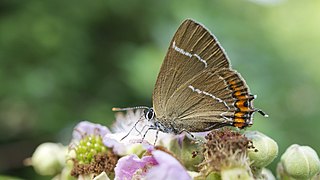
Lycaenidae is the second-largest family of butterflies, with over 6,000 species worldwide, whose members are also called gossamer-winged butterflies. They constitute about 30% of the known butterfly species.

The great purple hairstreak, also called the great blue hairstreak, is a common gossamer-winged butterfly species in parts of the United States. It is actually a Neotropical species; its North American range only includes the warm-temperate and subtropical parts of that continent, and it ranges southwards almost to the Isthmus of Panama. The type specimen, however, was shipped to Europe from the Colony of Virginia, probably around the time of the United States Declaration of Independence.

The green hairstreak is a small butterfly in the family Lycaenidae.

The brown hairstreak is a butterfly in the family Lycaenidae. The range includes most of the Palaearctic.

The purple hairstreak is a butterfly in the family Lycaenidae distributed throughout much of Europe, North Africa, Anatolia, Caucasia, and Transcaucasia. The larva feeds on Quercus robur, Quercus petraea, Quercus cerris and Quercus ilex.

The white-letter hairstreak is a butterfly in the family Lycaenidae.

The black hairstreak is a butterfly in the family Lycaenidae.

The subfamily Theclinae is a group of butterflies, often referred to as hairstreaks, with some species instead known as elfins or by other names. The group is part of the family Lycaenidae, the "gossamer-winged butterflies". There are many tropical species as well as a number found in the Americas. Tropical hairstreaks often have iridescent blue coloration above, caused by reflected light from the structure of the wing scales rather than by pigment. Hairstreaks from North America are commonly brown above. Few Theclinae are migratory. Members of this group are described as 'thecline'.

Satyrium spini, the blue spot hairstreak, is a butterfly in the family Lycaenidae.

Evenus is a butterfly genus in the family Lycaenidae, with species ranging from North to South America.

The Sandia hairstreak is a species of butterfly native to North America. A relatively rare butterfly with a limited range, it was discovered in La Cueva Canyon, Albuquerque, in spring of 1958, by Noel McFarland, then a student at the University of Kansas, and described the following year. The Sandia hairstreak was made one of the state insects of New Mexico in a 2002 bill approved the following year.

Callophrys gryneus, the juniper hairstreak or olive hairstreak, is a butterfly native to North America. It belongs in the family Lycaenidae.

Thyas coronata is a species of moth of the family Erebidae first described by Johan Christian Fabricius in 1775. It is found from the Indo-Australian tropics of southern China, Taiwan, Japan, Nepal, India, Sri Lanka to Micronesia and the Society Islands.

The silky hairstreak or chlorinda hairstreak is a butterfly belonging to the family Lycaenidae. The species was first described by Emile Blanchard in 1848. It occurs in Australia. It is the only species in the monotypic genus Pseudalmenus, described by Hamilton Herbert Druce in 1902.

Chlorostrymon simaethis, the silver-banded hairstreak, is a North and South American butterfly in the family Lycaenidae. It is also known as St. Christopher's hairstreak and the Key lime hairstreak.

Callophrys sheridanii, the Sheridan's hairstreak and Sheridan's green hairstreak, is a butterfly in the family Lycaenidae. It is found in North America along the south coast of British Columbia and parts of Nevada, Arizona, Saskatchewan, North Dakota, and New Mexico. In 2009, this species was adopted as the U.S. state butterfly for Wyoming.

Satyrium favonius, the oak hairstreak or southern hairstreak, is a butterfly of the family Lycaenidae. It is found in the United States from southern New England and the Atlantic Coast south to peninsular Florida and west to central Illinois, south-eastern Colorado and the Gulf Coast.

Pseudolycaena marsyas, the Cambridge blue, giant hairstreak or Marsyas hairstreak, is a species of butterfly in the family Lycaenidae.

Callophrys xami, commonly referred to as the xami hairstreak or green hairstreak, is a butterfly included in the subgenus Xamia and the genus Callophrys in the family Lycaenidae. It was described by Tryon Reakirt in 1867. Other common names for this species, depending on the region, include green hairstreak and elfin. C. xami is considered to be a very rare species of butterfly, and its typical range is in southern Arizona and Texas including down south to Guatemala. The juniper hairstreak and the silver-banded hairstreak butterflies are similar species, but both differ significantly from C. xami in regards to the postmedian white line running across the butterfly wings.

Ipidecla schausi, also called Schaus' hairstreak or Salvin's dwarf, is a small butterfly in the family Lycaenidae, sub-family Theclinae and genus Ipidecla.






















